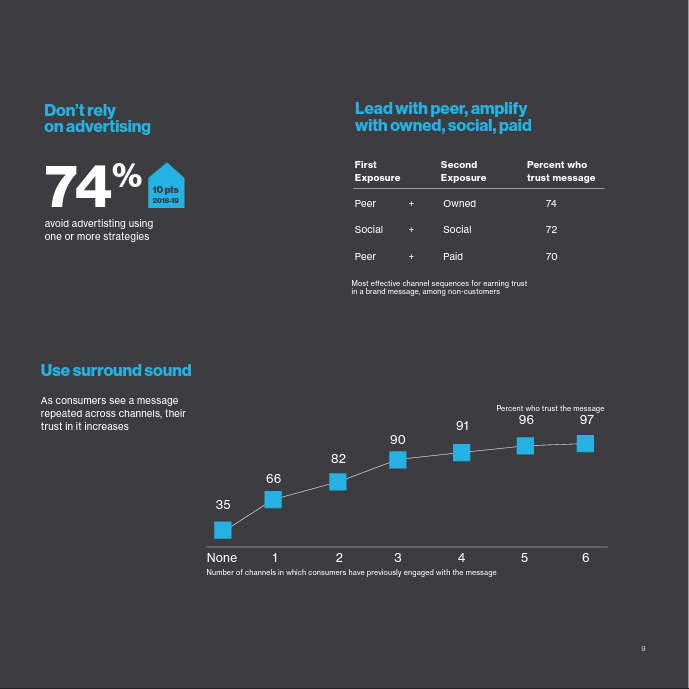Are you tired of media companies owning the reach and distribution of your content? Remember the good old days when something could ‘go viral.’ Today’s media-driven social media channels limit social media marketers from seeing the benefits of marketing inside a social network. Word-of-mouth shared content and leveraging the network effect are pipedreams for marketers who approach social media channels today.
Our best hope has been to engage social media influencers. While this hugely benefits many brands, it is inaccessible for many businesses, fast becoming media owned, expensive, and plagued by poor analyses.
Empowering your employees to share company content amplifies your brand reach through trusted networks and showcases the human side of your brand. But how integrated is this strategy within your overall social media plan? This post will explore why employee advocacy matters, how it fits into a larger marketing ecosystem, and tips for elevating its impact on engagement and ROI.
Disclaimer: Employee Advocacy will raise Culture Questions
Employee advocacy is a powerful tool for improving workplace culture but will inevitably raise questions about your existing culture and its effectiveness. Employee advocacy can highlight discrepancies between stated values and actual practices, provide critical feedback on current initiatives, and highlight areas of opportunity. It can also help to identify and address any issues that have been overlooked or ignored in the past, as well as create an open dialogue about how to make improvements.
Ultimately, employee advocacy can act as a catalyst for positive change in your workplace culture. So be ready to manage internal shifts and change management as you embark on this journey.
Employee advocacy: New kid on the social media block
In recent years, employee advocacy has become a popular social media tactic for social media strategies to embrace. As the name suggests, employee advocacy involves empowering employees to share company content and messages on their personal social media accounts.
Employee advocacy has many benefits, including increased reach, brand awareness, and SEO benefits. However, with any social media strategy, there are also some risks to consider. For example, if not appropriately managed, employee advocacy can lead to negative reviews and criticism of your company.
Social organic reach is a game changer.
It’s worth noting that social media algorithms do not work in your company’s favour. These algorithms tend to prioritise personal profiles over business ones, as personal profiles generate more engagement in likes, comments, and shares. However, sharing content on your profile can create more arrangement, increase organic reach, and potentially overcome algorithm bias against business profiles.
One of the benefits of leveraging social media in this way is the ability to amplify your company’s message and reach beyond the limits of traditional advertising. Our experience has shown that advocacy campaigns can outperform advertising campaigns regarding return on investment and engagement by 3-4 times.
Furthermore, your voice carries more weight than your company’s. By sharing content and engaging with your network, you can help build trust and credibility for your company and enhance its reputation. This can be a powerful tool in today’s digital age, where consumers place increasing value on authenticity and transparency.
Why should you care about employee advocacy?
1. Employee advocates are more trusted than businesses
According to Edelman’s Trust Barometer, people are far more likely to trust and be influenced by recommendations from friends, family, and colleagues than by marketing messages from businesses. That’s because we know that our friends and family have our best interests at heart, whereas companies are primarily motivated by profit.

2. Employee advocates can reach new audiences
When employees share your content on their personal social media channels, they expose your brand to new audiences that you may not have otherwise reached. And since these audiences trust the recommendations of their friends and family more than they trust advertising, they’re more likely to engage with your brand.
3. Employee advocacy boosts SEO
Whenever an employee shares one of your blog posts or articles on social media, it’s another opportunity for potential customers to find your website through a Google search. Social media’s direct impact on SEO ranking is limited, but sharing links across social platforms can increase brand exposure and ultimately influence SEO in several ways. Including wider content distribution, longer post lifespan, improved online visibility and organic traffic, increased brand recognition and reputation and enhanced local SEO. Although social media shares do not directly affect SEO rankings, they generate social signals that indicate the relevance of your content to your target audience. A recent study by CognitiveSEO found a positive correlation between social media shares and SEO, as search engines like Google use social signals such as shares, likes, and comments to rank websites.
The Value of Employee Advocacy Programs in Social Media Strategy
Employee advocacy is a powerful tool in any social media strategy. By encouraging your employees to share company content, you can tap into their networks and extend your reach beyond what you could do on your own. Investing in employee advocacy programs helps you build a larger audience and provides opportunities to gain valuable insights from their engagement with the content they share. With the proper focus, developing an integrated approach towards employee advocacy can be well worth it for any organisation looking to amplify its reach across multiple platforms today.






